| Srl | Item |
| 1 |
ID:
096184


|
|
|
| 2 |
ID:
067054
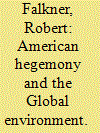

|
|
|
| 3 |
ID:
112342
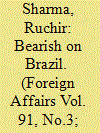

|
|
|
|
|
| Publication |
2012.
|
| Summary/Abstract |
Until recently, there seemed plenty of reasons to be bullish on Brazil. Having posted record growth for a decade and weathered the financial crisis well, the country looked poised to become a global economic leader. But the would-be giant stands on feet of clay. The economy depends too much on high commodity prices, and as demand falls, so may Brazil.
|
|
|
|
|
|
|
|
|
|
|
|
|
|
|
|
| 4 |
ID:
098285


|
|
|
|
|
| Publication |
Annapolis, Naval Institute Press, 2009.
|
| Description |
xiv, 256p.
|
| Standard Number |
9781591143130
|
|
|
|
|
|
|
|
|
|
|
|
Copies: C:1/I:0,R:0,Q:0
Circulation
| Accession# | Call# | Current Location | Status | Policy | Location |
| 055169 | 363.3253/GER 055169 | Main | On Shelf | General | |
|
|
|
|
| 5 |
ID:
133292
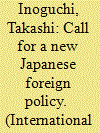

|
|
|
|
|
| Publication |
2014.
|
| Summary/Abstract |
Japanese foreign policy is at a crossroads. A global power transition is under way; while the United States remains the leading global power, across the globe non-western developing states are on the rise. Within Asia, China is a growing presence, wielding expansive claims on islands and maritime rights, and embarking on a defence buildup. As power shifts across Asia and the wider world, the terms of leadership and global governance have become more uncertain. Japan now finds itself asking basic questions about its own identity and strategic goals as a Great Power. Within this changing context, there are three foreign policy approaches available to Japan: (1) a classical realist line of working closely with the US in meeting China's rise and optimizing deep US engagement with China by pursuing a diplomacy focused on counterbalancing and hedging; (2) a transformative pragmatist line of rejuvenating itself through Abenomics and repositioning itself in East Asia; and (3) a liberal international line of pursuing a common agenda of enhancing global liberal-oriented norms and rules through multilateral institutions along with the United States and the Asia-Pacific countries. Current Japanese foreign policy contains a mix of all three approaches. The article argues that a greater focus on the second and the third lines would enhance the current approach; it would ensure that Japan is more in harmony with the global environment and help it work positively for global and regional stability and prosperity, thus enabling Japan to pursue an 'honorable place in the world' (as stated in the preamble to its constitution).
|
|
|
|
|
|
|
|
|
|
|
|
|
|
|
|
| 6 |
ID:
055994


|
|
|
| 7 |
ID:
112867


|
|
|
|
|
| Publication |
2012.
|
| Summary/Abstract |
Structural change brought about by the end of the Cold War and accelerated globalisation have transformed the global environment. A global governance complex is emerging, characterised by an ever-greater functional and regulatory role for multilateral organisations such as the United Nations (UN) and its associated agencies. The evolving global governance framework has created opportunities for regional organisations to participate as actors within the UN (and other multilateral institutions). This article compares the European Union (EU) and Association of Southeast Asian Nations (ASEAN) as actors within the UN network. It begins by extrapolating framework conditions for the emergence of EU and ASEAN actorness from the literature. The core argument of this article is that EU and ASEAN actorness is evolving in two succinct stages: Changes in the global environment create opportunities for the participation of regional organisations in global governance institutions, exposing representation and cohesion problems at the regional level. In response, ASEAN and the EU have initiated processes of institutional adaptation.
|
|
|
|
|
|
|
|
|
|
|
|
|
|
|
|
| 8 |
ID:
127886
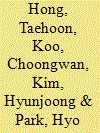

|
|
|
|
|
| Publication |
2014.
|
| Summary/Abstract |
The number of multi-family housing complexes (MFHCs) over 15 yr old in South Korea is expected to exceed 5 million by 2015. Accordingly, the demand for energy retrofit in the deteriorating MFHCs is rapidly increasing. This study aimed to develop a decision support model for establishing the optimal energy retrofit strategy for existing MFHCs. It can provide clear criteria for establishing the carbon emissions reduction target (CERT) and allow efficient budget allocation for conducting the energy retrofit. The CERT for "S" MFHC, one of MFHCs located in Seoul, as a case study, was set at 23.0% (electricity) and 27.9% (gas energy). In the economic and environmental assessment, it was determined that scenario #12 was the optimal scenario (ranked second with regard to NPV40 (net present value at year 40) and third with regard to SIR40 (saving to investment ratio at year 40). The proposed model could be useful for owners, construction managers, or policymakers in charge of establishing energy retrofit strategy for existing MFHCs. It could allow contractors in a competitive bidding process to rationally establish the CERT and select the optimal energy retrofit strategy. It can be also applied to any other country or sector in a global environment.
|
|
|
|
|
|
|
|
|
|
|
|
|
|
|
|
| 9 |
ID:
062562


|
|
|
| 10 |
ID:
109108
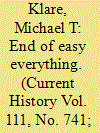

|
|
|
| 11 |
ID:
156436


|
|
|
|
|
| Summary/Abstract |
Asia is Europe’s largest trading partner and EU-Asia trade relations have undergone a rapid change since the global financial crisis. On a global scale, the new multilateral trade agreements such as the now stalled Trans-Pacific Partnership (TPP) involving European Unions’ (EU) major trading partners such as Japan, Singapore and Vietnam also have the potential to change the trade equations. In this paper, we evaluate the new EU trade policy which has been designed to ensure that the EU benefits from the changing global trade scenario and also look at the steps which have been taken by the EU to promote trade relations with its major trading partners in Asia in the predicted ‘Asian century’. We look into the Free Trade Agreements, which are being negotiated with its Asian partners and seek to understand the reasons which have resulted in delays in their signing and negotiations. We evaluate new policies pushed forward by its Asian partners such as the One Belt One Road policy by China and Japan’s policy of securing a large number of trading agreements in the America. Moving ahead, we also shed light on the indirect factors that may influence the success of EU trade negotiations in Asia such as the EU policy on granting China market economy status and the commencement of the ‘Brexit’ process. Lastly, we try to present a list of immediate priorities for EU in Asia, which will ensure that it secures a toehold in trade with the region. All in all, it is shown that the EU has not one and the same approach for all Asian countries but it negotiates flexibly and individually country by country. Because of this “country by country approach” the EU is also not ready to enter into general EU-ASEAN trade negotiations again.
|
|
|
|
|
|
|
|
|
|
|
|
|
|
|
|
| 12 |
ID:
115453
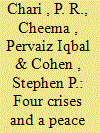

|
|
|
|
|
| Publication |
New Delhi, Harper Collins Publishers, 2007.
|
| Description |
ix,252p.
|
| Standard Number |
9788172237318
|
|
|
|
|
|
|
|
|
|
|
|
Copies: C:1/I:0,R:0,Q:0
Circulation
| Accession# | Call# | Current Location | Status | Policy | Location |
| 056849 | 327.1/CHA 056849 | Main | On Shelf | General | |
|
|
|
|
| 13 |
ID:
133651
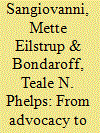

|
|
|
|
|
| Publication |
2014.
|
| Summary/Abstract |
We analyze forms of environmental activism that eschew the "information and socialization" politics typically associated with Transnational Advocacy Groups (TAGs) and instead favor direct, confrontational strategies, whose aim is to enforce international law. While mainstream TAGs typically seek influence through norm entrepreneurship, lobbying or "naming and shaming", what we label Direct Enforcement (DE) intervenes directly to halt (purportedly) illegal practices by states and private actors. DE activism has been most visible in transnational campaigns to protect endangered marine species, where environmental groups have resorted to damaging equipment used for illegal fishing and boarding fishing boats to enforce maritime conservation law. Often branded as eco-terrorism, such confrontational strategies have been largely ignored by scholarly literature on transnational activism. We contend that DE merits closer attention by IR-scholars for two reasons. First, DE activism plays an important role in enhancing the compliance pull of international laws in an area-the global environment-where states often lack capacity and political will to enforce international agreements. Second, an analysis of DE-activism provides important insights about issue selection and relative campaign success under different structural circumstances, thereby expanding our understanding of transnational advocacy more generally.
|
|
|
|
|
|
|
|
|
|
|
|
|
|
|
|
| 14 |
ID:
090765
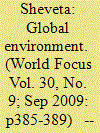

|
|
|
| 15 |
ID:
093613
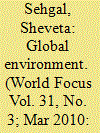

|
|
|
| 16 |
ID:
116148


|
|
|
| 17 |
ID:
021783


|
|
|
|
|
| Publication |
July 6, 2002.
|
| Description |
after 50(1-16)
|
|
|
|
|
|
|
|
|
|
|
|
|
|
|
|
| 18 |
ID:
086435


|
|
|
|
|
| Publication |
2009.
|
| Summary/Abstract |
The concept of global public goods has been advanced as a way of understanding certain transborder and global problems and the need for a coordinated international response. It has been used to describe everything from global environment, international financial stability, and market efficiency, to health, knowledge, peace and security, and humanitarian rights. Using an internal critique, this article finds that the concept is poorly defined, avoids analytical problems by resorting to abstraction, and masks the incoherence of its two central characteristics. The conclusion is that even if the concept of global public goods is effective rhetorically, precise definition and conceptual disaggregation are required to advance analysis of global issues.
|
|
|
|
|
|
|
|
|
|
|
|
|
|
|
|
| 19 |
ID:
076911
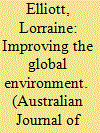

|
|
|
|
|
| Publication |
2007.
|
| Summary/Abstract |
Recent surveys in Australia show that improving the global environment rates high as a public policy concern. Responding to these challenges at a global level requires more than finding the best or most appropriate scientific, economic and technical approaches. It also requires that global environmental governance be based on sound normative principles. Two of the most important principles respond to the challenge that, while humanity is outstripping its ecological footprint, contributions to global environmental change are uneven and the experience of environmental harm is being displaced across time and space. Improving the global environment should therefore take into account the precautionary principle and the principle of common but differentiated responsibilities. Improving the global environment also requires a more robust institutional framework. The model favoured here is to build on UNEP to establish a more coherent, more authoritative and more independent environmental organization.
|
|
|
|
|
|
|
|
|
|
|
|
|
|
|
|
| 20 |
ID:
139121
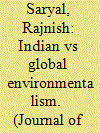

|
|
|